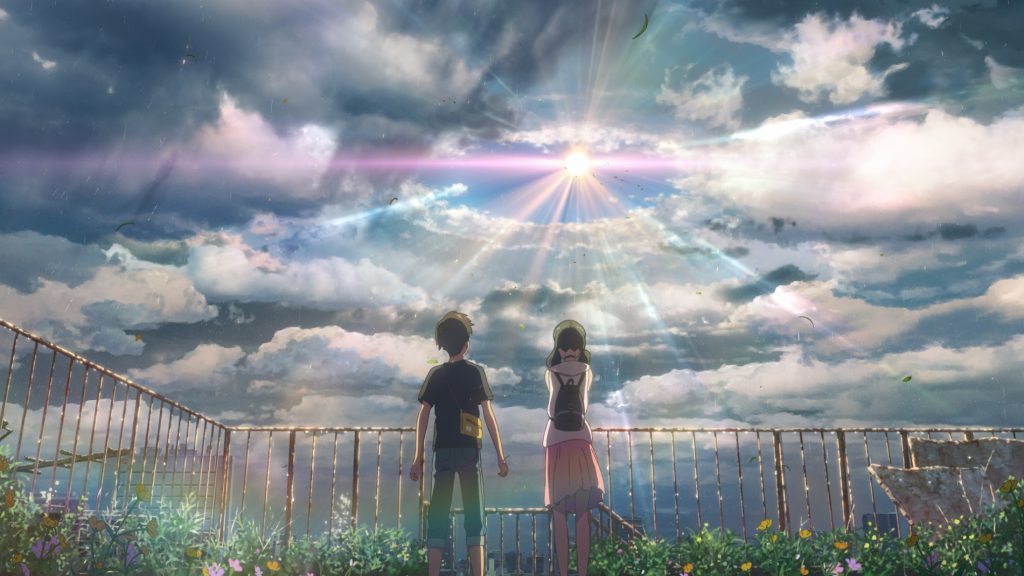JQ Magazine: Film Review — ‘Weathering with You’

By A.A. Sanborn (Shimane-ken, 2009-11) for JQ magazine.
Sun Amid the Clouds
*Warning: This review contains spoilers
“Don’t interfere with the weather too much,” warns a fortune teller early on: “Messing with nature always has a cost.” As the title suggests, weather is the focus for writer/director Makoto Shinkai’s newest feature film Weathering with You. It’s a tough act to follow after 2016’s Your Name, Shinkai’s previous work and the most commercially successful anime film of the last decade. Nevertheless, despite similarities in plot (adolescent romance, natural phenomena, and a sci-fi twist) the film offers a refreshing story which transports and delights.
We follow the friendship of Hodaka, a runaway from a remote island, and Hina, a girl with mysterious powers that temporarily conjure sunny skies. Hodaka is intent to find freedom in the big city, while Hina is just trying to get by. The number of scenes alone where characters resort to eating cheap instant ramen is an indicator that life is not going quite as planned. Still, adventure can be found just around the corner.
Soon after meeting, Hina and Hodaka start a business using Hina’s sun-producing powers. Their services are marketed to Tokyoites for weddings and outdoor events otherwise ruined by a rainy day. The sunny vignettes are one of the most charming aspects of the film, connecting it to a broader sense of space and community. Tokyo is no longer an anonymous megalopolis, but a city formed of friendships and relations.
While their business venture started innocently enough, with each sunny sky Hina beckons, the proceeding weather becomes more intense. Rain is no longer charmingly in the background of a typical wet season in June, but moves to the foreground battling for control. We see rain in many forms now, and with each new storm a sense of foreboding rises. Shinkai’s deft use of the rain as a character is a unique tool that he artfully displays. The film reaches its torrential climax when the past catches up with the duo and their time together is cut short.
The film is crafted in painstaking detail for which Shinkai is known. He applies techniques he pioneered in his 2013 short film The Garden of Words to visualize realistic rain, clouds, and light. Weathering puts all of Tokyo on display in its misty, dewy, best. His portrayal also captures the excitement of the megalopolis, both lovingly idealized and realistic. Weathering invites viewers into a compelling world of magical realism, making the flights of fancy all the more charming.
Constantly present in the background are nuanced issues in Japanese society: from the sex-trafficking industry and the working poor, to anxieties surrounding family law and child welfare. Shinkai doesn’t deal with these issues head-on, but alludes gently to their presence throughout. Perhaps this lack of confrontation is a loss for the film, as it could have achieved something deeper.
Like Shinkai’s previous films, the storytelling rises above a simple adolescent romance. Shinkai moves to greater issues he has been hinting at all along: a looming natural disaster. Your Name was created partially as an emotional response to the tragic tsunami on March 11, 2011; this film, like the rain which constantly falls, is about something in our lives which won’t go away. By the end, Tokyo is returning to the marsh it once was and change is irreversible. Amid constant rain, Tokyoites now picnic indoors and take ferries around the city. While Your Name was ultimately a story of recovery in the face of disaster, Weathering is one of assimilation to a new reality.
With beautiful visuals and compelling characters, Weathering with You is a charming world you want to believe. At the same time, you realize that every seemingly inconsequential human desire will lead us to a place we no longer know. Perhaps Shinkai suggests we are already living this reality. With each passing year the answer is slowly appearing through the clouds.
Weathering with You is now playing nationwide. For showtimes, click here.
For more JQ film reviews, click here.


Comments are closed.